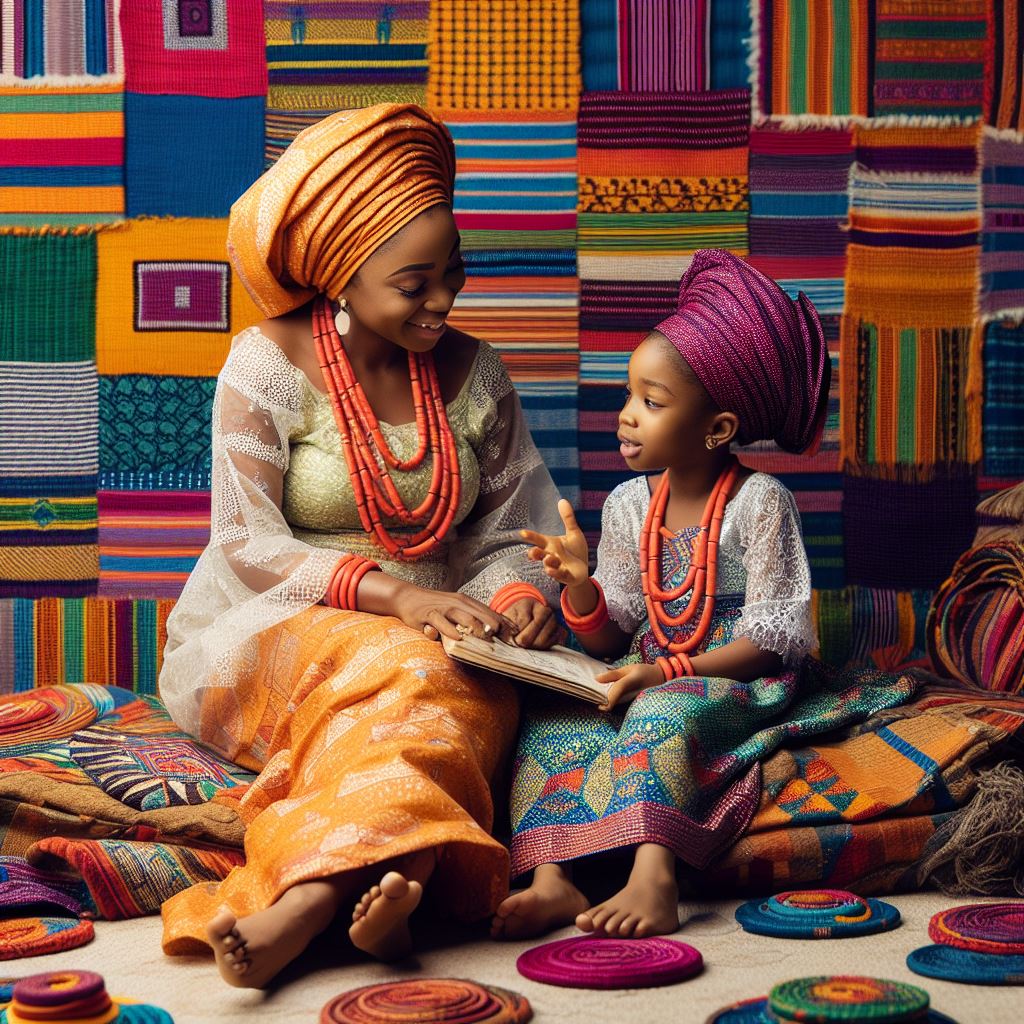Introduction
Gender identity is a crucial topic that needs to be discussed with Nigerian parents.
Understanding the importance of this conversation and defining gender identity is essential. This blog post will provide an overview of the upcoming discussions.
Importance of Discussing Gender Identity with Nigerian Parents
Initiating conversations about gender identity is crucial to create a safe and accepting environment for all individuals.
Nigerian parents play a pivotal role in shaping their children’s understanding of gender.
Definition of Gender Identity
Gender identity refers to an individual’s deeply held sense of being male, female, or another gender, which might not necessarily align with the sex assigned at birth.
It is an internal perception of oneself, relating to one’s gender.
Overview of the Blog Post
This blog post aims to educate Nigerian parents on the concept of gender identity and its significance.
It will offer guidance on addressing this topic confidently and sensitively.
Additionally, it will explore common misconceptions and provide resources for further information.
By discussing gender identity openly, Nigerian parents can foster a supportive and inclusive environment for their children.
Understanding and acceptance are key in promoting the emotional well-being and happiness of individuals.
Understanding Gender Identity
When it comes to understanding gender identity and its significance, it is important to go beyond the surface level.
We need to delve into the differences between sex and gender, the concept of gender as a social construct, and the various elements that encompass gender identity.
This section aims to provide Nigerian parents with a comprehensive guide on these crucial topics.
Difference between sex and gender
Sex refers to the biological attributes one inherits at birth, such as male or female reproductive organs.
Parenting Made Just for You
Get personalized Parenting Solutions tailored to your child’s needs. Transform your parenting journey with expert guidance in 1-3 days.
Get StartedGender, on the other hand, is a social and cultural construct that encompasses the expectations, roles, and behaviors society assigns to individuals based on their sex.
Discussing gender as a social construct
Gender is not simply a reflection of one’s biological attributes; it is a complex framework that shapes our understanding of masculinity, femininity, and everything in between.
Society perpetuates norms and expectations that dictate how individuals should behave based on their assigned gender.
The concept of gender identity
Gender identity refers to an individual’s deeply felt sense of being male, female, or something else entirely.
It is an internal sense of self that may or may not align with the sex assigned at birth.
Gender identity is a deeply personal experience and may vary from person to person.
Differentiating between gender identity, gender expression, and sexual orientation
Gender identity, gender expression, and sexual orientation are three distinct aspects that contribute to individual identity.
- Gender identity: Refers to how a person perceives and experiences their internal gender, which may be transgender, cisgender, or non-binary.
- Gender expression: Refers to the way someone presents their gender identity through clothing, hairstyles, behavior, and other external factors.
- Sexual orientation: Refers to an individual’s emotional, romantic, and/or sexual attraction to others, such as being heterosexual, homosexual, or bisexual.
Understanding the complexities of gender identity
Understanding the complexities of gender identity is crucial for Nigerian parents to better support their children and foster an inclusive environment.
Here are some ways parents can navigate this territory:
- Educate yourself: Take the time to learn about different gender identities and the challenges individuals may face.
This knowledge will empower you to have meaningful conversations and provide support. - Communicate openly: Encourage an environment where your child feels comfortable discussing their gender identity and expressing their feelings.
Listen attentively and validate their experiences without judgment. - Respect pronouns and chosen names: Affirm the identity of your child by using their preferred pronouns and chosen name.
This simple act can go a long way in demonstrating acceptance and respect. - Advocate for inclusivity: Challenge stereotypes and discrimination that reinforce rigid gender roles.
Teach your child the importance of accepting others, regardless of their gender identity. - Seek support: Reach out to organizations and support groups that specialize in gender identity and provide resources for parents.
Connecting with others who have similar experiences can be comforting and enlightening.
Understanding gender identity is an ongoing journey, and as parents, it is vital to approach it with an open mind and a willingness to continuously learn and grow.
By embracing diversity and creating an inclusive environment, Nigerian parents can ensure their children thrive and live authentically.
Read: Raising Boys and Girls: Tips for Nigerian Families
Factors Influencing Gender Identity
Biological factors
Biological factors, such as genetics and hormones, contribute to the development of an individual’s gender identity.
- Chromosomes: The presence of XX chromosomes typically assigns female gender, while XY chromosomes typically assign male gender.
- Hormonal influences: Hormones, such as estrogen and testosterone, play a role in the physical development and differentiation of male and female traits.
Social and cultural factors
Society and culture play a crucial role in defining gender roles and expectations.
Unveil the Perfect Name that Tells Your Family's Story
Let us help you find a name that embodies your family's values, traditions, and dreams. Our personalized consultation weaves cultural insights to create a name that's uniquely yours.
Get Started- Gender norms: Society establishes certain standards and expectations for how males and females should behave, influencing individuals’ understanding of their own gender identity.
- Stereotypes: Cultural stereotypes perpetuate specific behaviors, appearances, and interests deemed appropriate for males and females, impacting individuals’ self-perception.
Environmental and upbringing factors
Environmental factors significantly influence an individual’s gender identity development.
- Family influence: The family, as the primary social unit, molds a child’s perception of gender through role modeling, reinforcement, and cultural teachings.
- Peer influence: Peers and friends can enforce gender norms and expectations, shaping an individual’s understanding and expression of gender.
- School and community: Educational and community environments contribute to a person’s gender identity through curriculum, activities, and socialization with others.
The role of parents and family in shaping gender identity
The role of parents and family in shaping gender identity: Parents and family members play a pivotal role in shaping a child’s understanding and acceptance of their gender.
- Parental attitudes and behaviors: Parents’ attitudes towards gender roles and their behaviors influence how a child perceives and expresses their own gender identity.
- Acceptance and support: The level of acceptance and support parents provide plays a vital role in allowing a child to explore and express their authentic gender identity.
- Communication and education: Open and honest communication between parents and children about gender identity fosters understanding and acceptance.
- Breaking gender stereotypes: Parents can challenge traditional gender roles and encourage their children to embrace their unique interests and expressions.
In short, gender identity is influenced by a combination of biological, social and cultural, and environmental factors.
Parents and family members have a significant role in shaping a child’s understanding and acceptance of their gender identity.
By promoting positive attitudes, challenging stereotypes, and encouraging communication, parents can create an inclusive and accepting environment for their children to explore and express their authentic selves.
Read: Gender Roles in Nigeria: What Parents Should Know
Signs of Gender Identity Exploration in Children
Early Signs and Expressions of Gender Identity
- Children may exhibit gender-specific behaviors such as playing with toys typically associated with their gender.
- They may express preferences for clothing, hairstyles, or accessories that align with a particular gender.
- Some children may insist on being referred to by a different name or pronouns that match their gender identity.
- Showcasing interest in activities or roles traditionally attributed to a different gender might be another indicator.
- Pay attention to a child’s imaginative play, as they may enact scenarios that reflect their gender identity.
Importance of Observation and Open Communication
- Observe your child’s behaviors and preferences without judgment, providing a safe space for exploration.
- Openly communicate with your child about their feelings, thoughts, and experiences regarding their gender identity.
- Establish a trusting relationship where they can freely express themselves and ask questions.
- Listen actively, validate their emotions, and offer support as they share their journey of self-discovery.
Supporting and Validating a Child’s Exploration
- Educate yourself on gender identity, including terminology and concepts, to better understand your child’s experiences.
- Seek guidance from professionals, such as therapists or support groups, who specialize in gender identity issues.
- Encourage your child to express themselves authentically and respect their choices regarding gender expression.
- Support and defend your child’s gender identity within your family, community, and educational institutions.
- Ensure their environment is inclusive and free from discrimination or bullying.
Remember, it is essential to provide unconditional love, acceptance, and support as your child explores their gender identity.
By doing so, you create a nurturing environment where they can grow and thrive as their authentic selves.
Read: Understanding Gender: Basics for Nigerian Parents

Common Challenges Faced by Nigerian Parents
Nigerian parents face numerous challenges when it comes to navigating gender identity issues with their children.
These challenges are often deeply rooted in cultural expectations, traditional gender roles, and societal attitudes towards non-binary gender identities.
To effectively support and advocate for their children, parents must confront these challenges head-on.
Cultural expectations and traditional gender roles
One of the most significant challenges Nigerian parents face is the pressure to adhere to cultural expectations and traditional gender roles.
Nigerian society places great importance on conformity, expecting individuals to conform to the roles associated with their biological sex.
This can create immense difficulty for parents who are trying to support and validate their children’s unique gender identities.
Stigma associated with non-binary gender identities
Non-binary individuals in Nigeria face considerable stigma due to the prevalent binary gender system.
Society’s lack of acceptance for gender non-conforming individuals leads to discrimination, exclusion, and marginalization.
Nigerian parents fear that their child’s non-binary gender identity will subject them to societal judgment, rejection, or even violence, which further complicates their journey.
Fear of societal judgment and discrimination
The fear of societal judgment and discrimination adds an extra layer of complexity to the challenges faced by Nigerian parents.
Parents may worry about how society will perceive their child’s gender identity and the impact it will have on their future prospects, such as education, employment, and relationships.
This fear can lead to reluctance in embracing their child’s true gender identity openly and authentically.
Addressing concerns of extended family members and community
Nigerian parents often grapple with addressing the concerns raised by extended family members and the community.
In this communal society, the opinions and expectations of others hold significant weight.
Parents may face pressure from relatives and the community to conform to traditional gender norms, making it incredibly challenging to support their child’s gender identity without fear of backlash or isolation.
In general, Nigerian parents face several common challenges when navigating their children’s gender identities.
These challenges stem from cultural expectations, stigma surrounding non-binary gender identities, fear of societal judgment, and pressures from extended family and the community.
Despite these challenges, it is crucial for parents to remember that understanding, acceptance, and support are fundamental in ensuring their child’s wellbeing and happiness.
By confronting these challenges head-on and educating both themselves and others, Nigerian parents can create a more inclusive and accepting society for their children to thrive in.
Read: Ovulation Pain: Should Nigerian Parents Worry?
Promoting Healthy Gender Identity Development
In order to promote healthy gender identity development in children, it is important for Nigerian parents to create a safe and accepting environment at home.
This can be achieved through:
Creating a safe and accepting environment at home
- Respecting and valuing the individuality and choices of each child.
- Ensuring that all family members feel comfortable expressing themselves.
- Establishing open lines of communication where children can freely discuss their feelings and experiences.
- Setting boundaries that protect children from discrimination or judgment based on their gender identity.
Encouraging open and respectful conversations about gender
- Initiate discussions about gender topics, encouraging children to ask questions and share their thoughts.
- Always listen attentively and validate their feelings, even if they differ from traditional gender norms.
- Help children understand that gender is not binary and that there is a wide range of gender identities.
- Teach empathy and encourage children to respect others’ gender identities and expressions.
Providing diverse gender representations and role models
- Expose children to a variety of gender representations in books, movies, and other forms of media.
- Showcase individuals who defy gender stereotypes and have successful careers and fulfilling lives.
- Include diverse gender identities and expressions in discussions about historical figures and notable people.
- Encourage children to explore different gender roles and express themselves authentically.
Emphasizing self-acceptance and self-expression
- Teach children that their gender identity is valid and that they should embrace and celebrate it.
- Encourage them to express themselves in ways that align with their authentic gender identity.
- Support their choices in clothing, hairstyle, hobbies, and interests without judgment.
- Promote self-confidence and self-esteem by highlighting their strengths and unique qualities.
By following these guidelines, Nigerian parents can play a crucial role in promoting healthy gender identity development in their children.
Creating an environment of acceptance and understanding will contribute to their overall well-being and help them navigate their gender identity with confidence.
Supporting Gender Diverse Children
Supporting gender diverse children is an essential aspect of parenting in today’s diverse society.
Nigerian parents must understand the importance of providing a supportive and inclusive environment for their children.
Here are some ways to ensure that they do just that:
Seeking professional guidance
Seeking professional guidance is crucial. Nigeria has seen a rise in gender clinics and professionals who specialize in supporting gender-diverse individuals.
Parents should reach out to these experts to gain a better understanding of their child’s needs and how they can provide appropriate support.
Connecting with support networks and communities
Connecting with support networks and communities can play a significant role in navigating gender diversity.
There are various organizations and online communities that provide resources, advice, and a sense of belonging.
By joining these networks, parents can learn from others who have gone through similar experiences and find comfort in knowing they are not alone.
Advocating for inclusive policies and education
Advocating for inclusive policies and education is vital to create a more accepting society.
Nigerian parents should actively engage with schools and educational institutions, encouraging the development of policies that promote inclusivity.
They should also advocate for comprehensive gender education that teaches children about different gender identities and promotes respect and understanding.
Fostering resilience and self-confidence in children
Fostering resilience and self-confidence in children is crucial.
Parents should encourage their children to express themselves authentically, free from societal expectations and prejudices.
By supporting their child’s gender identity, parents can help build their self-esteem and resilience, enabling them to navigate any challenges they may face.
Supporting gender diverse children requires a proactive and inclusive approach from Nigerian parents.
By seeking professional guidance, connecting with support networks, advocating for inclusive policies, and fostering resilience, parents can create an environment that celebrates their child’s unique gender identity.
We can ensure that all children, regardless of their gender identity, feel accepted, loved, and supported.
Conclusion
This blog post has discussed several key points for Nigerian parents to consider regarding gender identity.
By engaging in open and honest discussions about gender identity with their children, parents can create a safe and supportive environment for their child’s development.
It is crucial to embrace diversity and promote acceptance, as this is essential for the overall well-being of children.
By accepting and affirming their child’s gender identity, parents can foster a sense of self-worth and belonging.
Understanding that gender identity is complex and can vary from person to person helps parents challenge societal stereotypes and norms.
This will allow their children to grow up with a positive and healthy understanding of themselves and others.
It is important for Nigerian parents to educate themselves about gender identity and make themselves available to answer any questions or concerns their children may have.
By creating a judgment-free space, parents can demonstrate their love and support for their child’s gender identity.
Ultimately, by taking these steps, Nigerian parents can contribute to a more inclusive society, where all individuals feel valued and accepted for who they are.
This approach is crucial for the well-being and happiness of their children.




